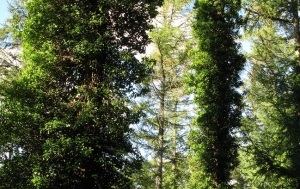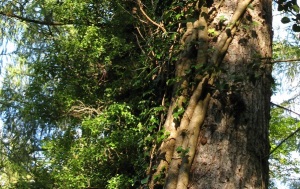Ivy on Larch Trees at Hisley Wood

Density of ivy varies from tree to tree
Ivy on trees is often the subject of great debate. On one hand it casts dense shade and on the other it’s a valuable source of late season nectar and provides other wildlife benefits. Earlier this month ecologists from Devon Wildlife Consultants surveyed Hisley Wood with a view to protecting some of the ivy clad larch trees above the derelict remains of Boveycombe farmstead ahead of the winter programme of woodland management. They were on site to provide advice to the felling team and to identify some of the monumental larches to save for the benefit of bats. As bats and their roosts are protected by law the Woodland Trust and its contractors needed to understand where the most likely places were for woodland bats to roost. Many species are known to use these trees; pipistrelles, noctules and long-eared bats all frequent the Bovey Valley. Even the rare barbastelle will use ivy on larch as an occasional refuge.

Thicker ivy stems provide more protection for bats
The ecologists studied each larch tree in the area where thinning works are planned. This whole exercise was a balancing act between encouraging lichen diversity, shrubs and ground flora and maintaining safe roosts for bats. The ecologist explained “It’s not just about the amount of ivy on the tree, it’s more to do with the thickness of the ivy stem. The most attractive crevices for bats are created where the larger ivy stems are close to the tree bark and provide a deep protected space for them to shelter in”.
This study has now identified the trees to protect and the trees which will be removed to allow in the sunlight to the woodland, lichen and plants beneath.
Hisley Wood is a Site of Special Scientific Interest due to the assemblages of lichen and other natural diversity. The Woodland Trust and Natural England manage this reserve for the benefit of wildlife and the expertise from Devon Wildlife Consultants is an essential element of conserving the various habitats along the valley.
by Matt Parkins
Last update: 03 Nov 2015 5:12pm

